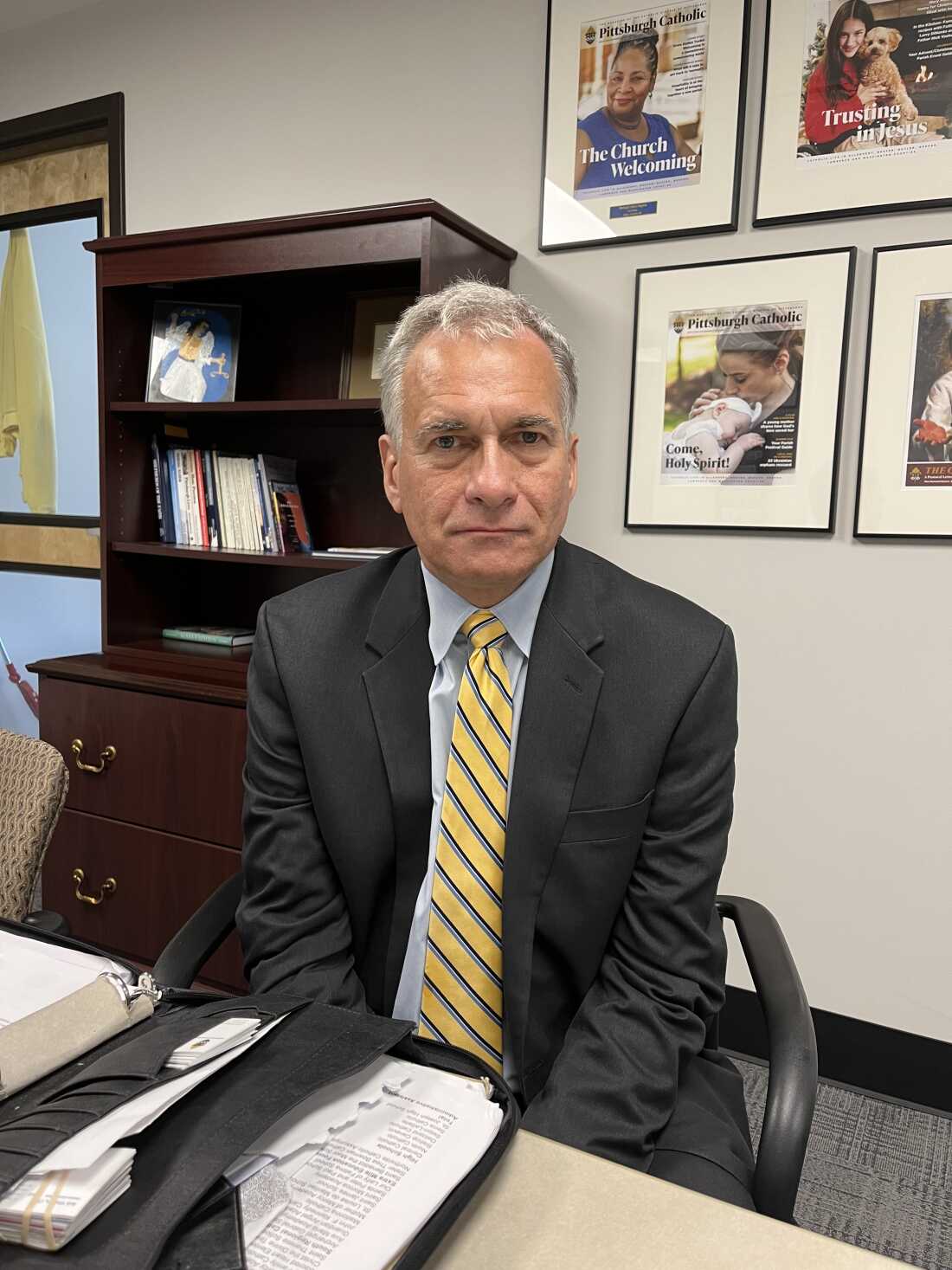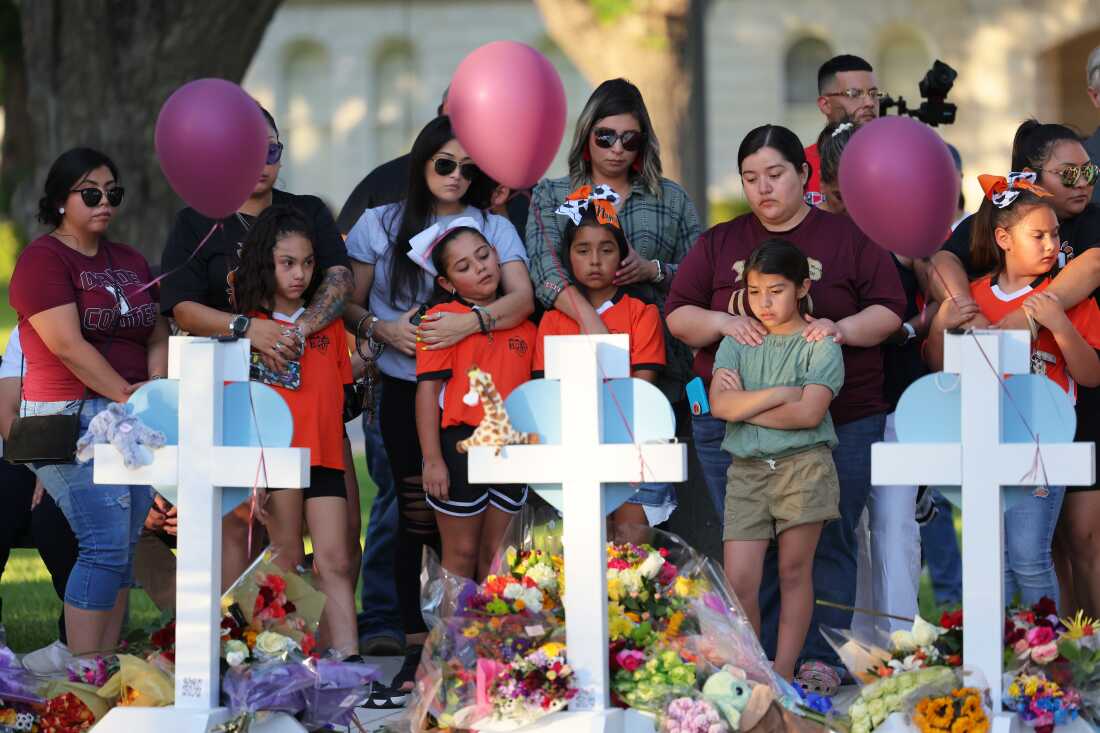
Police maintain a presence following a school lockdown after 911 calls falsely reported a gunman in Oakland Catholic and Pittsburgh Central Catholic schools on March 29, 2023.
Jeff Swensen/Getty Images
hide caption
toggle caption
Jeff Swensen/Getty Images
The risks of gun violence in schools were made tragically clear again in Georgia, where a teenager stands accused of shooting his way through his high school and killing two students and two teachers.
In Pittsburgh in March 2023, it was a false alarm that a gunman was roaming one Catholic high school and then another that touched off frightening evacuations and a robust police response in the city. It also prompted the diocese to rethink what constitutes a model learning environment.
So months after SWAT teams met hundreds of students, the Catholic Diocese of Pittsburgh began forming its own armed police force.
Wendell Hissrich, a former safety director for the city and career FBI unit chief, was hired that year to form a department to safeguard 39 Catholic schools as well as dozens of churches in the region. Hissrich has since added 15 officers and four supervisors, including many formerly retired officers and state troopers, who now oversee school campuses fitted with Stop the Bleed kits, cameras, and defibrillators.

Wendell Hissrich, a former career FBI unit chief, was hired by the Catholic Diocese of Pittsburgh in 2023 to help thwart gun violence in schools. He has since hired many retired officers and state troopers, who oversee school campuses fitted with Stop the Bleed kits, cameras, and defibrillators.
Christine Spolar for KFF Health
hide caption
toggle caption
Christine Spolar for KFF Health
When religious leaders first asked for advice after what are known as “swatting” incidents occurred, the veteran lawman said he didn’t hesitate to deliver blunt advice: “You need to put armed officers in the schools.”
But he added that the officers had to view schools as a special assignment: “I want them to be role models. I want them to be good fits within the school. I’m looking for someone to know how to deal with kids and with parents — and, most importantly, knows how to de-escalate a situation.”
Gun violence is a leading cause of death for young people in America, and the possibility of shootings has influenced costly decision-making in school systems as administrators juggle fear, duty, and dizzying statistics in efforts to keep schools safe from gun harm.
Still, scant research supports the creation of school police forces to deter gun violence — and what data exists can raise as many questions as answers. Data shows over half of U.S. firearm deaths are, in fact, suicides — a sobering statistic from the federal Centers for Disease Control and Prevention that reflects a range of ills.
Gun violence grew during the COVID-19 pandemic and studies found that Black children were 100 times as likely as white children to experience firearm assaults.
Research on racial bias in policing overall in the U.S. as well as studies on biased school discipline have prompted calls for caution. And an oft-cited U.S. Secret Service review of 67 thwarted plots at schools supports reasons to examine parental responsibility as well as police intervention as effective ways to stop firearm harm.
The Secret Service threat assessment, published in 2021, analyzed plots from 2006 to 2018 and found students who planned school violence had guns readily at home. It also found that school districts that contracted sworn law officers, who work as full or part time school resource officers, had some advantage. The officers proved pivotal in about a third of the 67 foiled plots by current or former students.
“Most schools are not going to face a mass shooting. Even though there are more of them — and that’s horrible — it is still a small number,” said Mo Canady, executive director of the National Association of School Resource Officers. “But administrators can’t really allow themselves to think that way. They have to think, ‘It could happen here, and how do I prevent it.'”

A student from Oakland Catholic High School receives comfort following the evacuation of the school after a call of an active shooter on March 29, 2023 in Pittsburgh, Pennsylvania. Many schools, including Oakland Catholic and Pittsburgh Central Catholic, were targeted as part of what authorities are calling “computer-generated swatting calls.” Many agencies, including state and municipal police, are conducting investigations.
Jeff Swensen/Getty Images
hide caption
toggle caption
Jeff Swensen/Getty Images
$1 million to station police in schools
About a 20-minute drive north of Pittsburgh, a top public school system in the region decided the risk was too great. North Allegheny Superintendent Brendan Hyland last year recommended retooling what had been a two-person school resource officer team — staffed since 2018 by local police — into a 13-person internal department with officers stationed at each of the district’s 12 buildings.
Several school district board members voiced unease about armed officers in the hallways. “I wish we were not in the position in our country where we have to even consider an armed police department,” board member Leslie Britton Dozier, a lawyer and a mother, said during a public planning meeting.
Within weeks, all voted for Hyland’s request, estimated to cost $1 million a year.
Hyland said the aim is to help 1,200 staff members and 8,500 students “with the right people who are the right fit to go into those buildings.” He oversaw the launch of a police unit in a smaller school district, just east of Pittsburgh, in 2018.
Hyland said North Allegheny had not focused on any single news report or threat in its decision, but he and others had thought through how to set a standard of vigilance. North Allegheny does not have or want metal detectors, devices that some districts have seen as necessary. But a trained police unit willing to learn every entrance, stairway, and cafeteria and who could develop trust among students and staffers seemed reasonable, he said.
“I’m not Edison. I’m not inventing something,” Hyland said. “We don’t want to be the district that has to be reactive. I don’t want to be that guy who is asked: ‘Why did you allow this to happen?’”

People visit memorials for victims of a mass shooting at Robb Elementary School in Uvalde, Texas. Nineteen children and two adults were killed after a man entered the school through an unlocked door and barricaded himself in a classroom where the victims were located. Law enforcement officers waited in the hallway for over an hour before entering the classroom and confronting the gunman.
Michael M. Santiago/Getty Images/Getty Images North America
hide caption
toggle caption
Michael M. Santiago/Getty Images/Getty Images North America
A tragic failure in Uvalde
Since 2020, the role of police in educational settings has been hotly debated. The video-recorded death of George Floyd, a Black man in Minneapolis who was murdered by a white police officer during an arrest, prompted national outrage and demonstrations against police brutality and racial bias.
Some school districts, notably in large cities such as Los Angeles and Washington, D.C., reacted to concerns by reducing or removing their school resource officers. Examples of unfair or biased treatment by school resource officers drove some of the decisions. This year, however, there has been apparent rethinking of the risks in and near school property and, in some instances in California, Colorado, and Virginia, parents are calling for a return of officers.
The 1999 bombing plot and shooting attack of Columbine High School and a massacre in 2012 at Sandy Hook Elementary School are often raised by school and police officials as reasons to prepare for the worst. But the value of having police in schools also came under sharp review after a blistering federal review of the mass shooting in 2022 at Robb Elementary School in Uvalde, Texas.
The federal Department of Justice this year produced a 600-page report that laid out multiple failures by the school police chief, including his attempt to try to negotiate with the killer, who had already shot into a classroom, and waiting for his officers to search for keys to unlock the rooms. Besides the teenage shooter, 19 children and two teachers died. Seventeen other people were injured.
The DOJ report was based on hundreds of interviews and a review of 14,000 pieces of data and documentation. This summer, the former chief was indicted by a grand jury for his role in “abandoning and endangering” survivors and for failing to identify an active shooter attack. Another school police officer was charged for his role in placing the murdered students in “imminent danger” of death.
Pursuing accountability for gun violence
There have also been increased judicial efforts to pursue enforcement of firearm storage laws and to hold accountable adults who own firearms used by their children in shootings. For the first time this year, the parents of a teenager in Michigan who fatally shot four students in 2021 were convicted of involuntary manslaughter for not securing a newly purchased gun at home.
In recent days, Colin Gray, the father of the teenage shooting suspect at Apalachee High School in Georgia, was charged with second-degree murder — the most severe charges yet against a parent whose child had access to firearms at home. The 14-year-old, Colt Gray, who was apprehended by school resource officers on the scene, according to initial media reports, also faces murder charges.
Hissrich, the Pittsburgh diocese’s safety and security director, said he and his city have a hard-earned appreciation for the practice and preparation needed to contain, if not thwart, gun violence. In January 2018, Hissrich, then the city’s safety officer, met with Jewish groups to consider a deliberate approach to safeguarding facilities. Officers cooperated and were trained on lockdown and rescue exercises, he said.
Ten months later, on Oct. 27, 2018, a lone gunman entered the Tree of Life synagogue and within minutes killed 11 people who had been preparing for morning study and prayer. Law enforcement deployed quickly, trapping and capturing the shooter and rescuing others caught inside. The coordinated response was praised by witnesses at the trial where the killer was convicted in 2023 on federal charges and sentenced to die for the worst antisemitic attack in U.S. history.
“I knew what had been done for the Jewish community as far as safety training and what the officers knew. Officers practiced months before,” Hissrich said. He believes schools need the same kind of plans and precautions. “To put officers in the school without training,” he said, “would be a mistake.”
KFF Health News is a national newsroom that produces in-depth journalism about health issues and is one of the core operating programs at KFF — the independent source for health policy research, polling, and journalism.


